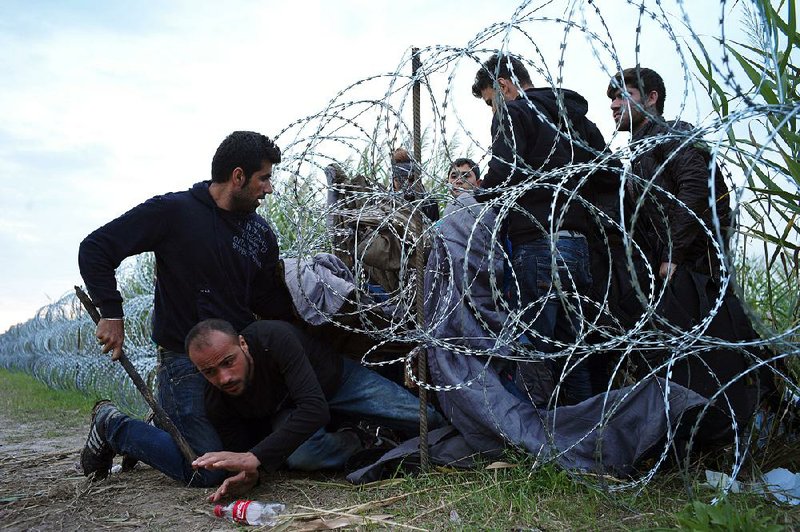ROSZKE, Hungary -- Migrants trying to cross Europe to get to more prosperous areas are clambering over and scuttling under a razor-wire fence Hungary has built to keep them out, underscoring the difficulties of controlling people fleeing war and poverty.
In Roszke, a Hungarian border town, police used tear gas to break up a brief scuffle involving about 200 people requesting asylum, mostly from Syria, Iraq and Afghanistan. Police said the migrants were growing impatient with registration delays.
So far the Hungarian border fence, which is being built hastily, consists of three layers of razor wire along the country's 109-mile border with Serbia.
One group, including women and children, crawled under it Wednesday, using blankets, sleeping bags, jackets and a stick to raise the wire. As a police car approached, the migrants dashed through a field.
"[It's been] very, very difficult," Odei, a Syrian from Daraa, said once he reached Hungary. "We were here from yesterday. We are very hungry. There's no food, there's no medicine for the children, there's nothing. We are so tired."
These migrants are following the Balkans route, from Turkey to Greece by sea, up north to Macedonia by bus or foot, by train through Serbia, and then walking the last few miles into European Union member Hungary. That avoids the more dangerous Mediterranean Sea route from North Africa to Italy, where dozens of bodies were found Wednesday in the hull of a smugglers' boat that was rescued off Libya's northern coast.
Once inside the 28-nation EU, most migrants seek to reach richer nations such as Germany, the Netherlands or Sweden.
In Germany, however, far-right protesters booed and jeered Chancellor Angela Merkel as she visited an asylum center Wednesday in the eastern town of Heidenau, which was the scene of weekend riots. Merkel urged Germans to stand up against hatred and vowed zero tolerance for attacks against refugees.
"It's shameful and repulsive what we experienced here," Merkel said.
More than 100 jeered and sounded car horns as Merkel spoke in Heidenau. Some protesters shouted "Lying press!" while at least one woman held a placard denouncing the chancellor as a "race traitor" -- a phrase used by the Nazis to refer to people who dealt with or had relationships with Jews.
More than 10,000 people, including many women with babies and small children, have crossed into Serbia over the past few days and headed toward Hungary.
On the Serbian side of the border, groups were camping or strolling along the Hungarian fence Wednesday, looking for ways to beat it. An old blanket was thrown over it at one spot to cover the razor wire; a hole was dug under it elsewhere.
The migrants' goal is to cross without being spotted by Hungarian border police so they will not be detained and sent to Hungarian asylum centers, where they are fingerprinted. The migrants don't want to go through the asylum process in financially struggling Hungary.
"If I get fingerprinted in Hungary, I don't go to Germany," said Abdul Majed, a 25-year-old language student from Syria. "We make fingerprints in Germany, so you will be a refugee in Germany, not in Hungary."
Even when they are fingerprinted in Hungary, many still head north and west to wealthier countries.
By Wednesday morning, 1,302 had been detained at Hungary's southern border with Serbia, said Karoly Papp, Hungary's national police chief. Police said 2,533 migrants were detained Tuesday, up from 2,093 Monday, with the numbers setting records nearly every day.
Papp said more than 2,100 police "border hunters" would be deployed beginning Sept. 15, with helicopters, police dogs and patrols on horseback. Water cannons also will be sent to Szeged, the largest city in the region. Hungarian lawmakers next week will consider authorizing the government to use the armed forces to help with border security.
"The organization, equipment and great mobility of the border guard units ... will decrease the security risks caused by the massive illegal migration," Papp said.
The hard-hit nations of Greece, Italy and Hungary have urged other EU nations to do more to help share the burden, but some are refusing to do so because of strong anti-migrant sentiment or budget constraints.
Migration will figure high on the agenda of a Western Balkan summit in Vienna today. The EU, meanwhile, released $1.7 million worth of humanitarian aid Wednesday for refugees in Serbia and Macedonia.
Elsewhere, a Swedish rescue crew found 51 people dead in the hull of a wooden ship after rescuing 439 from the vessel on the Mediterranean.
Swedish coast guard spokesman Mattias Lindholm said the victims probably died of asphyxiation. The bodies were placed in bags to make sure they didn't come into contact with survivors.
The Italian coast guard said that in addition to the 51 dead discovered by the Swedish Poseidon crew, three women were found dead in another migrant boat and another corpse was found during the 10 rescue operations that were initiated Wednesday. The coast guard said around 3,000 people were rescued as Libya-based smugglers took advantage of calm seas to send overloaded boats to Europe.
Greece's coast guard said Wednesday that it had rescued 578 people in 15 incidents at sea near the islands of Lesbos, Chios, Samos and Kos from Tuesday morning through Wednesday morning. The figure doesn't include those who arrive at the islands themselves from the nearby Turkish coast, usually in inflatable dinghies.
Information for this article was contributed by Pablo Gorondi, Lorne Cook, Frank Jordans, Dusan Stojanovic, Nicole Winfield, Karl Ritter, Kerstin Sopke and staff members of The Associated Press.
A Section on 08/27/2015

